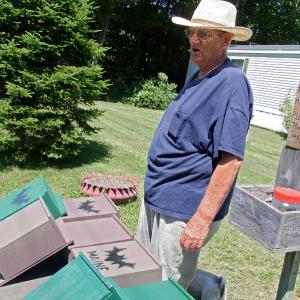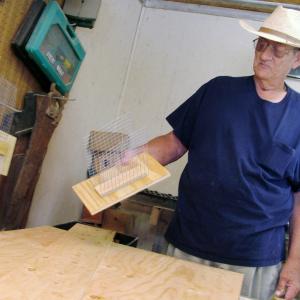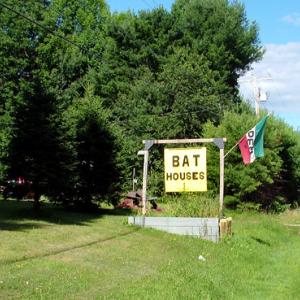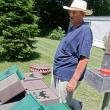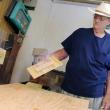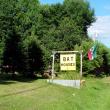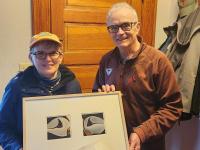Why to get a bat house in Belfast*
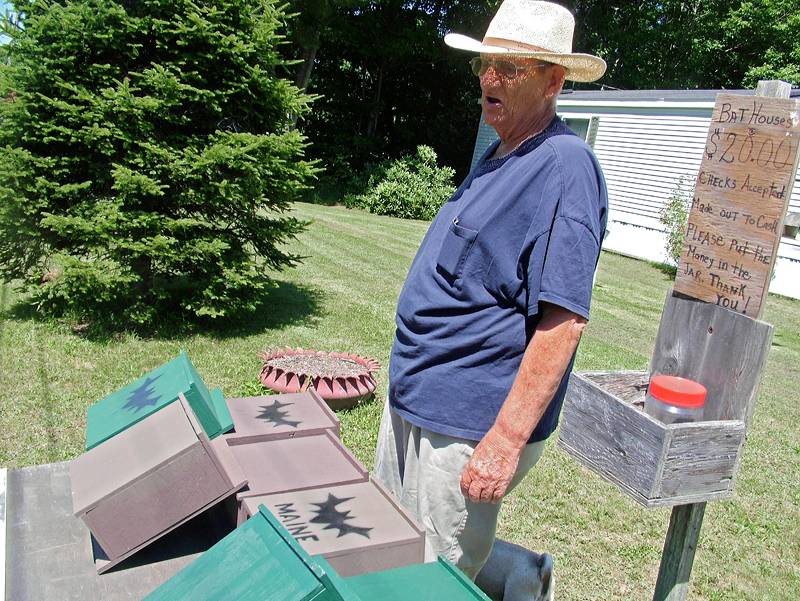 Adrian Turner surveys the traffic on Route 3 from behind a display of his homemade bat houses. (Photo by Ethan Andrews)
Adrian Turner surveys the traffic on Route 3 from behind a display of his homemade bat houses. (Photo by Ethan Andrews)
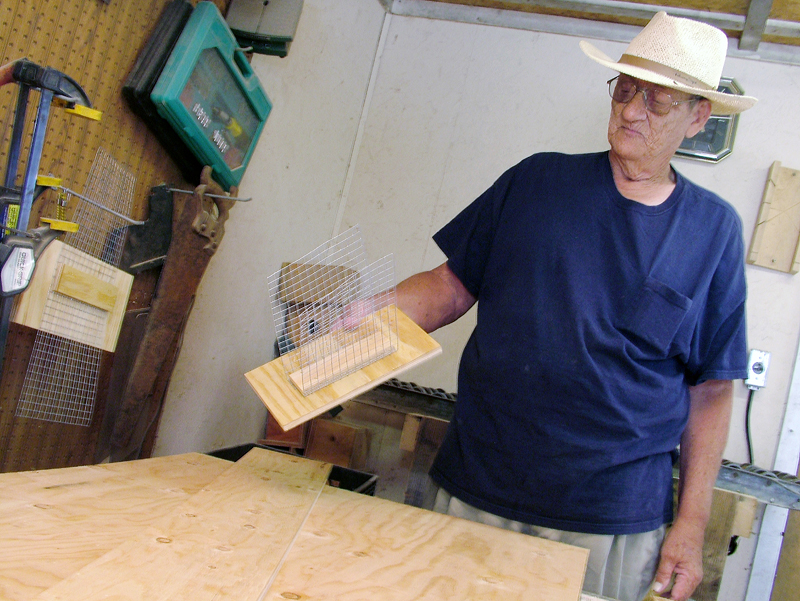 In his workshop, Adrian Turner shows the wire mesh interior of one of his bat houses. (Photo by Ethan Andrews)
In his workshop, Adrian Turner shows the wire mesh interior of one of his bat houses. (Photo by Ethan Andrews)
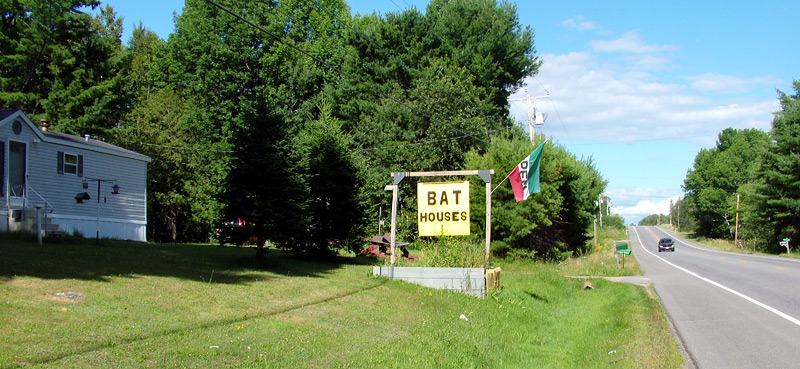 One of several prominent signs in front of Adrian Turner's Route 3 residence advertising his homemade bat houses (Photo by Ethan Andrews)
One of several prominent signs in front of Adrian Turner's Route 3 residence advertising his homemade bat houses (Photo by Ethan Andrews)
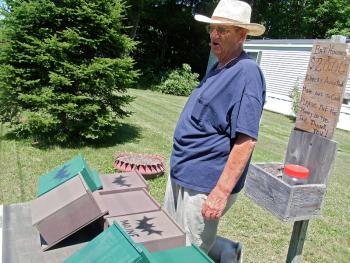 Adrian Turner surveys the traffic on Route 3 from behind a display of his homemade bat houses. (Photo by Ethan Andrews)
Adrian Turner surveys the traffic on Route 3 from behind a display of his homemade bat houses. (Photo by Ethan Andrews)
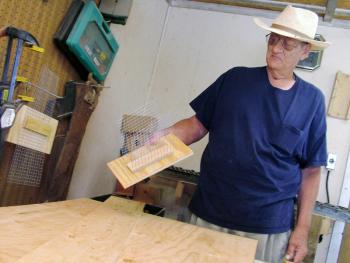 In his workshop, Adrian Turner shows the wire mesh interior of one of his bat houses. (Photo by Ethan Andrews)
In his workshop, Adrian Turner shows the wire mesh interior of one of his bat houses. (Photo by Ethan Andrews)
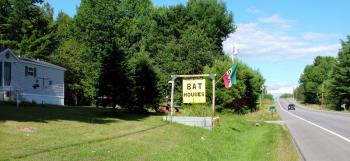 One of several prominent signs in front of Adrian Turner's Route 3 residence advertising his homemade bat houses (Photo by Ethan Andrews)
One of several prominent signs in front of Adrian Turner's Route 3 residence advertising his homemade bat houses (Photo by Ethan Andrews)
“Many people think of bats as vicious animals that carry diseases and get tangled in hair. Others consider them to be friendly, cuddly animals that need only our love and understanding. Both images are somewhat misguided.”
- From A Homeowner’s Guide to Northeastern Bats and Bat Problems, Penn State College of Agricultural Sciences
BELFAST – Adrian Turner's isn't the only bat house business in the area, but his gauntlet of bold, yellow and black signs lining Route 3 arguably shines the brightest light on those mailbox-sized nocturnal nooks.
Turner started making bat houses 15 years ago while working in the Merchant Marine. An injury forced him to retire soon after. Now walking with a perceptible limp, he presides over a home-business domain that includes, within an area the size of a medium sized swimming pool, his house, a small woodshop and a display table to show his wares.
Turner is friendly in a matter-of-fact way. When asked how he got started building bat houses, he offers a simple, and maybe obvious, explanation: “I had a lot of bats around here one time. So I looked on the Internet to find out a way to make a bat house and started making them."
Bats like to nest in attics, under eaves or other recesses of homes where they could be regarded as a nuisance. They also eat a lot of pests insects like mosquitoes, so there’s a benefit to keeping them around, which is where bat houses come in. The idea is to give the bat colony an alternate home just before you bat-proof your own — a procedure essentially of plugging their entryways when they're out for the evening, but with enough nuance to warrant more careful study, maybe in the same place one learns to build bat houses.
Turner's bat houses are fairly simple structures — a slotted box with two strips of wire mesh inside for the bats to cling to — but building them consumes enough time and materials that he regards it more as a labor of love than a business.
He builds them in a small shop behind his home using a table saw, a band saw and pneumatic nail gun, painting the finished ones in subdued earth tones and decorating some with a stenciled silhouette of a bat. On the lawn between his house and Route 3 he keeps a dozen or so on a table with a sign indicating the price, $20. Below the sign hangs a jar for payments on the honor system.
“I haven’t been beaten too bad,” he said. “...You get a few [who] need that bat house more than … ”
He paused for moment, apparently derailed by the dumb logic of stealing a bat house.
“... something,” he said.
Standing by the road, Turner watched the traffic go by, occasionally brushing away a Japanese beetle. It was mid-July and swarms of the bugs circled a nearby bush.
“I don’t know how you get rid of those things,” he said. “They’re horrible. If someone comes up with a way to do that they’d make a lot of money.”
Turner figures he could probably make a fair amount of money — maybe even a living — if he sold his bat houses online, but he doesn’t want to deal with the hassle of shipping. The way he does it now, he sells 200 to 250 of them a year.
Many more people stop by to ask questions and take pictures.
For those who buy, he typically recommends one house for anything short of a major infestation. Occasionally someone buys a bunch, like a trucker who recently bought extras to give to his friends up north. Another customer bought ten bat houses with the stated intention of reselling them for more money. Turner didn't mind.
Another time a woman challenged him with the classic gift-giver’s dilemma: What do you buy for the person who has everything?
Turner told her he had no idea.
“You buy them a bat house!” she said. “They ain’t got one of them.”
Address
Route 3
Belfast, ME 04915
United States

